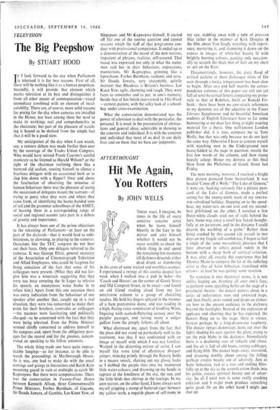AFTERTHOUGHT
Hit Me Again, You Rotters
By JOHN WELLS
THERE must, I imagine, be times in the life of every sensitive creative artist when he stares himself blearily in the face in the mirror and asks himself whether it would not be more sensible to chuck the whole thing in and spend the remaining few moments till darkness descends either dead drunk or slumbering in the arms of some wicked and worthless woman. I experienced a twinge of this cosmic despair last week when I walked into a pub in Soho—the 'Coach and Horses' on the corner of Greek Street and Old Compton Street, to be exact—and found an old friend reading aloud from my last SPECTATOR column to a group of chuckling toadies. He held his fingers splayed in the manner of a ham pantomime dame, and was reading in a high, fluting voice reminiscent of Godfrey Winn, lingering with eyelash-fluttering ecstasy over the purpler passages, and raising many a vulgar guffaw from the pimply fellows all about.
What distressed me, apart from the fact that the piece did not stand up particularly well to the treatment, was that I was confronted with an image of myself with which I was not familiar. Warped in the distorting mirror of satire, I saw myself like some kind of effeminate Doppel- ganger, mincing primly through the flowery fields in a mauve smock, shaking out my glossy locks as I dabbed the purple tints into my mannered little water-colours, and throwing up my hands in rapture at the loveliness of the sky, the sun, and the little birds that chirrup in the treetops. In my own mirror, on the other hand, I have always seen myself gripping a stump of battered cigar between my yellow teeth, a roguish gleam of self-irony in my eye, stabbing away with a tube of prussian blue rather in the manner of Kirk Douglas it the film about Van Gogh, wrestling with experi-
ence, mastering it, and slamming it down on the canvas in images of white-hot beauty lit with brightly burning colours, pausing only occasion- ally to scratch the thick mat of hair on my chest or spit on the floor.
Disconcertingly, however, the great flood of critical acclaim at these Zolaesque slices of life seen through a husky temperament has been slow to begin. After two and half months the corres- pondence columns of this paper are still not yet full of semi-hysterical letters comparing my prose- style to that of Rabelais, Swift or Ronald Fir- bank : there have been no awe-struck references to my dynamic use of the adjective in the Times Literary Supplement, and no beautiful American students of English Literature have so far come hammering at my door last thing at night wanting material for a thesis. One well-known London publisher did, it is true, compare me to Tom Wolfe, but that was only because we do our hair the same way. Otherwise I have to content myself with watching men in the Underground turn heavy-lidded to the page in question, mouth the first few words of the column, and then slump heavily asleep. Hence my distress at this final blow from the Philistines of Greek Street last Friday.
The next morning, however, I received a bright blue picture postcard from Switzerland. It was headed 'Come off it Wells.' The Lake of Geneva,' it went on, 'looking curiously like a picture post- card of the Lake of Geneva, made a perfect setting for the twenty-ninth week of my seEcra- ma-subsidised holiday. Stepping on to the speed- boat, my water-skis on one arm and my second- best girl-friend on the other, I watched a few fleecy-white clouds scud out of sight behind the Jura. Some way away a small boy licked thought- fully at an ice-cream, and in the distance I could discern the warbling of a grebe.' Rather than being crushed by this second vile assault in two days on my fragile self-confidence, I began to feel a tingle of the same masochistic pleasure that I have observed in others poked rudely in the bottom with a sharp barb of satirical criticism. It was, after all, exactly this experience that led Thomas Mann to compare the lot of the suffering artist to that of Saint Sebastian, transfixed with arrows : at least he was getting some reaction.
To translate it into theatrical terms, it is not unlike leaping on, beaming all over one's face, to perform some appalling ballet on the stage of a provincial theatre : the dancer patters about in a series of unfortunate runs and awkward leaps, and then finally spins round and drops an elabor- ate bow to the unseen audience in the darkness beyond the footlights. Instead of the explosion of applause and cheering that he has expected, the flowers flung on to the stage, there is silence, broken perhaps by a long-drawn-out raspberry. The dancer tiptoes downstage, leans out over the lights shading his eyes against the glare, trying to see the pale blobs in the darkness. Immediately there is a deafening roar of ridicule and abuse, and the air is full of old boots, rotting cabbages, and flying filth. The dancer leaps away, reassured, and prancing nimbly about among the falling garbage creates beauty out of adversity. Just as Saint Sebastian, tied to a tree and smiling bliss- fully up at the sky as the seventh arrow thuds into his pelvis, creates spiritual beauty out of adver- sity. So all I need now is some really crushing criticism and I might even produce something quite good. Or on the other band I might just shut up.


































 Previous page
Previous page